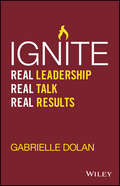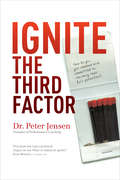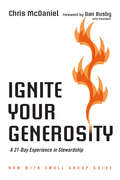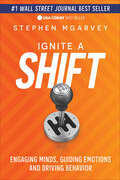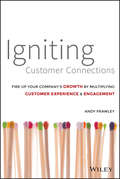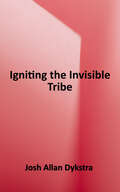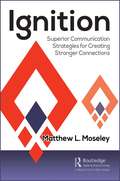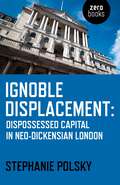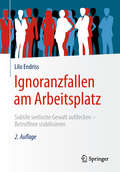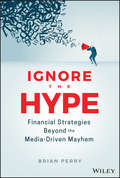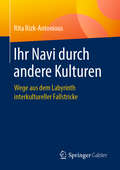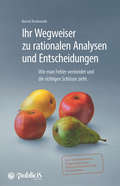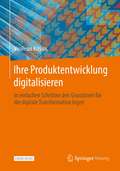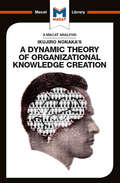- Table View
- List View
Iggy's Bread of the World
by Kathleen L. Mcginn Alexis GendronIn January 1994, Igor and Ludmilla Ivanovic opened the doors of their bakery, Iggy's Bread of the World. This case describes their unusual mission statement and the way in which they try to bring a social consciousness mentality to a for-profit business. Six years later, they have grown beyond their physical and administrative capacity. The Ivanovics must decide how to reconfigure the leadership structure of the company without losing their control over the fundamentals.
Ignite
by Gabrielle DolanLearn the authentic leadership skills that drive today's workforce to excel Ignite: Real Leadership, Real Talk, Real Results is an honest guide to achieving lasting business success by becoming a more authentic leader. Leaving behind the boring and mundane, this guide cuts to the chase with a frank and forthright style to provide insight that can radically transform your business. You'll learn how your communication style may be holding you back, and how a few simple changes can inspire your team, engage your customers, and remind you just how effective you can be. Storytelling is a powerful business tool, and this book shows how to find your own stories and dig deep to learn what's driving your leadership and motivating your diverse workforce. You'll successfully navigate the uncertain terrain brought about by mixed generational expectations, evolving technology, and a rapidly shifting culture as you learn to respond and adapt to become a more effective leader. Communication is everything, and leaders are expected to be "on message" at all times. Today's workers want to know the "why" behind the "what", and this guide shows you how to tailor your message and your entire communication style to have the biggest impact. Cut through the "boring" and "bull" and be real Communicate with impact across all platforms Ignite your teams, your customers, and yourself Level up, step out, and discover what you stand for The rapid rise of technology and social media has resulted in "information fatigue", and most leaders respond by communicating in logic and data. This approach has little impact on the shifting workforce demographics, and each new generation brings higher expectations from their employers and leaders. Ignite shows you how to exceed those expectations and become the authentic leader that drives today's business success.
Ignite The Third Factor
by Dr Peter JensenHow do you get someone else committed to reaching their fullest potential? It’s a question that challenges new managers and seasoned executives alike, echoes through coaches’ heads as they watch a gifted athlete underachieve, and keeps parents up at night. Igniting the Third Factor, Peter synthesizes his life’s work into the five core practices exceptional leaders use to ignite the Third Factor in themselves and others – whether it’s in the locker room before a gold medal Olympic hockey game or at a routine performance review. Peter works through an easy-to-understand model, providing a clear view of what separates ’igniters’ from ’extinguishers’ and exploring a wealth of strategies you can put to use immediately in your world. Like the laws of physics, these principles apply in any environment. They may look different when used by a parent, a manager, or a coach, but the forces of work remain the same. Igniting the Third Factor is a fast-paced journey packed with familiar faces, engaging stories, and humor. As he moves from the dressing room to the corner office and back again, Peter weaves insights from well-known Canadian, American, and British coaches and executives with his personal experience to provide a practical guide to helping others excel – all set against the backdrop of an exciting 30 years of involvement in the Canadian Olympic Movement.
Ignite Your Generosity: A 21-Day Experience in Stewardship
by Chris McDanielWe know it's important to be generous. But it can be hard to know what healthy stewardship looks like in our families and churches. What if God has deeper and richer lessons to teach us about what it means to live generously? Ignite Your Generosity will help you see your resources of time, talents and treasures in a fresh, God-honoring way. A twenty-one-day devotional, this book is now expanded with a four-week small group guide that is perfect for both individual and church use. Every day's reading features an engaging story, Scripture for further study and personal reflection questions to grow in the area of stewardship. Begin your journey of pursuing generosity God's way. Discover the joy and fulfillment that comes from a life of giving freely to his plans and purposes.
Ignite a Shift: Engaging Minds, Guiding Emotions and Driving Behavior
by Stephen McGarveyHow effective leaders use communication to spark transformation: “Terrific insights and tools on how to create behavioral shifts.” —John Howlett, President, Bunzl CanadaThe ability to persuade and influence is the cornerstone of successfully navigating change management. In Ignite a Shift, internationally acclaimed speaker Stephen McGarvey explores the subtleties of effective communication and highlights the essential fact that thinking impacts emotions, which drive behavior.Ignite a Shift is the quintessential guide to communication, positive persuasion, and influencing with integrity. It reveals the proven techniques that the world’s most effective leaders are using to motivate themselves and others to excel professionally and personally.“An insightful guide that supplies readers with practical tools to help influence, persuade, and motivate the people around them. The focus on the power of positivity, linguistics, and storytelling are crucial techniques whether you are leading a team, negotiating a contract, or simply attempting to better frame conversations in everyday life.” —Michael Baghramian, Financial Advisor, Forbes List of America’s Next Gen Advisors, 2019 & 2021
Ignite an Explosion of Ideas: Submarines and Tubular Bells-Produce More Innovative Ideas
by Frans JohanssonThe most successful innovators produce and realize an incredible number of ideas. But why are some innovators more productive than others? And what, if anything, does that have to do with thinking that crosses disciplines? This chapter answers these questions.
Ignite the Secret: 19 Lessons for Business and Life
by Charles HortonAn entrepreneur shares powerful strategies for confronting challenges, acting decisively, and achieving everything you’ve ever dreamed of.Entrepreneur and motivational speaker Charles Horton takes vital lessons he has learned in business and life—as well as from firewalking, walking on glass, mingling with lions, and building multiple businesses—and applies them to the challenges of personal and professional life with remarkable success. Now, his trailblazing approach can be yours. Ignite the Secret will inspire you to . . .See opportunities, not obstaclesTriumph over self-doubtFocus on your goalsCreate your own realityShift your perspectiveStoke your internal fireOvercome any challengeAccomplish your dreamsThe hardest part of changing your life is knowing how to start. Ignite the Secret empowers you to take that first step—and all the steps that follow.Praise for Ignite the Secret“You rarely come upon a piece of writing that is the complete package drawing you in with every lesson, vivid personal story and simple wisdom you can use in your own life right away.” —Monica Steiner, Aging Evolution“Whether or not you ever choose to do a firewalk, these nineteen lessons can transform your life as if you had.” —Dave Albin, Former Anthony Robbins Companies Fire Captain
Igniting Customer Connections: Fire Up Your Company's Growth By Multiplying Customer Experience and Engagement
by Andrew FrawleyA new data-driven approach to building customer relationships that fuel sustainable business growth Igniting Customer Connections explores how organizations of all sizes can build powerful and profitable customer relationships in a today's increasingly complex, fast-paced, and fragmented marketplace. Written by the president of one of the world's largest marketing firms, the book provides expert insights about connecting with customers effectively across all channels and over time. The central premise is a refreshingly different, evidence-based approach called Return On Experience and Engagement, or ROE2, which delivers a new way to inspire and measure customer connections—and improve business results. The traditional marketing campaign—a battle for attention with a clear launch date and endpoint—no longer works. Marketing is faster and more complex than ever, and consumers now have the power to turn off the message. Igniting Customer Connections explores the benefits of a new approach that enables companies to connect with customers, rather than just talk at them. Topics include: Why classic ROI is losing relevance as a way to measure results—and to budget marketing spend How to make powerful connections by taking full advantage of "atomic moments of truth" Amplifying the impact of customer experience and engagement Creating a continuous, measurable, repeatable process for growth The key to winning customers and building long-term business is creating positive customer experiences that inspire ongoing engagement—from Facebook "likes" to purchase decisions. Based on data and stories drawn from dozens of top brands and thousands of consumers, Igniting Customer Connections helps marketers create long-term brand equity and sustainable business growth.
Igniting the Invisible Tribe: Designing an Organization That Doesn't Suck
by Josh Allan DykstraWhy is it that so many of us toil away in jobs we hate, being treated like machines, doing things that will eventually ruin the planet? Is this really the best we can do with our work and our lives? Concluding a massive research project spanning the fields of behavioral economics, future trend analysis, and management science, Josh Allan Dykstra elegantly shows how the world of work is evolving-and that the competitive advantage of business is shifting towards something much more life-giving than where we've been.
Ignition: Superior Communication Strategies for Creating Stronger Connections
by Matthew L. MoseleyIgnition: Superior Communication Strategies for Creating Stronger Connections is a book of dispatches from the frontlines of communication strategy. Matthew L. Moseley draws on his eclectic life experiences to investigate the link between success and effective communication. Whether he’s choreographing a fine dining experience at the top restaurant in America, using rock stars to register voters, helping a national chain save its reputation after a gaffe goes viral, or serving as media liaison at the epic ash-blast send-off for author Hunter S. Thompson, Moseley identifies the principles that guide communication strategies toward their goals. In extensive interviews with a wide variety of experts, including authors, fighter pilots, business leaders, politicians, and astrophysicists, Moseley tests these principles, teases out new, provocative ideas, and anticipates how forming stronger connections will help us address today’s greatest challenges. Though it tackles serious subjects, offers an illuminating perspective on the evolution of human discourse, and shares important insights on interpersonal relations, Ignition is also a good, fun read. A broad range of colorful anecdotes gives this book of philosophical wisdom and practical advice the zest of a juicy memoir.
Ignoble Displacement: Dispossessed Capital in Neo-Dickensian London
by Stephanie PolskyWe live in a time of great social, political and economic crisis that many date to the collapse of the global banking system in 2008. Many are finding it difficult to contextualise the hardships that have taken place in the years following on from those events. It is difficult to find the answers in our present media landscape, or in a political and intellectual climate that continues to laud capitalism as the winning economic system coming out of both World War II and the end of the Cold War, which has become over the last century synonymous with democracy itself. The irony is that in our times the majority of the world&’s people feel disenfranchised by both capitalism and democracy. How did we come to this historical juncture? What can we learn not just from history, but from our cultural artefacts that might tell us how we first came to conduct ourselves within a system of global finance capitalism? This volume proposes that we reinterpret the writings of Charles Dickens to find the antecedents of our present situation with regards to capital, empire and subjectivity.
Ignorance and Uncertainty (Econometric Society Monographs #61)
by Olivier Compte Andrew PostlewaiteBorn of a belief that economic insights should not require much mathematical sophistication, this book proposes novel and parsimonious methods to incorporate ignorance and uncertainty into economic modeling, without complex mathematics. Economics has made great strides over the past several decades in modeling agents' decisions when they are incompletely informed, but many economists believe that there are aspects of these models that are less than satisfactory. Among the concerns are that ignorance is not captured well in most models, that agents' presumed cognitive ability is implausible, and that derived optimal behavior is sometimes driven by the fine details of the model rather than the underlying economics. Compte and Postlewaite lay out a tractable way to address these concerns, and to incorporate plausible limitations on agents' sophistication. A central aspect of the proposed methodology is to restrict the strategies assumed available to agents.
Ignoranzfallen am Arbeitsplatz: Subtile Seelische Gewalt Aufdecken - Betroffene Stabilisieren
by Lilo EndrissKränkung durch Ignoranz ist eine sehr subtile Form seelischer Gewalt, und sie verursacht in Unternehmen Millionenschäden. Lilo Endriss bietet Aufklärung, Unterstützung der Betroffenen und Prävention. Da Mitarbeiter oft mit dem Erkennen und Bewältigen dieser Art von subtilen seelischen Attacken überfordert sind, richtet sich dieses Buch vorrangig an Leser mit Personalverantwortung, die außerhalb des niederträchtigen Machtspiels stehen. Aber auch direkt Betroffene finden hier hilfreiche Hinweise.Ignorante Verhaltensweisen werden oft absichtlich eingesetzt, um eine andere Person zu schädigen. Die unmittelbare Kommunikation wird systematisch verweigert, um sie als Machtmittel einzusetzen, etwa durch das permanente Nichteingehen auf die Anliegen des Gegenübers oder durch soziale Ausgrenzung. Hier sind Führungskräfte gefordert. Dieses fundierte Buch sensibilisiert den Leser für das Thema und stellt eine Fülle von Methoden zur Verfügung, um Fallen aufzudecken und Betroffene zu stabilisieren.
Ignore Everybody
by Hugh MacleodHugh MacLeod's acclaimed blog Gaping Void draws 1. 5 million visitors a month, and his ebook, How to Be Creative, has been downloaded more than a million times. In Ignore Everybody, he expands his thoughts about unleashing creativity in a world that often thwarts it.
Ignore Everybody: And 39 Other Keys to Creativity
by Hugh MacleodIn this book, the author has expanded his thoughts about unleashing creativity in a world that often thwarts it.
Ignore Your Customers (and They'll Go Away): The Simple Playbook for Delivering the Ultimate Customer Service Experience
by Micah SolomonDiscover how to create exceptional customer service and a superior customer experience, learning from the greatest companies of our time.When it comes to delivering great customer service and customer experience, many companies miss the mark. But there&’s no reason this should include you and your company. Ignore Your Customers (and They&’ll Go Away) spells out, step by step, how to craft a customer service culture and customer experience so powerful that they&’ll transform your organization and boost your company&’s bottom line.You&’ll enjoy inspirational, often hilarious, tales from the trenches as author Micah Solomon, one of the world&’s best-known customer service consultants, relates hands-on adventures about assessing and improving customer service in various industries.You&’ll spend time behind the scenes with Zappos CEO Tony Hsieh and discover how the company delivers &“wow&” customer service. From Richard Branson, you&’ll learn how Virgin brands deliver authentic customer service (avoiding what Branson calls &“Stepford Customer Service&”) and Branson&’s secrets for turning social media attackers into brand promoters.Drawing on a wealth of stories personally assembled from today&’s most innovative and successful companies, including Amazon, Cleveland Clinic, Drybar, USAA Insurance, and The Ritz-Carlton Hotel Company, Solomon reveals what it takes to turn a ho-hum customer interaction into one that drives customer engagement and lifelong loyalty.
Ignore the Hype: Financial Strategies Beyond the Media-Driven Mayhem
by Brian PerrySecure your investment gains and supercharge your results with this down-to-earth analysis of investing fundamentals Via powerful and unique insights, Ignore the Hype: Financial Strategies Beyond the Media-Driven Mayhem teaches readers how to keep their focus squarely on time-tested strategies for meeting their financial goals without getting distracted by a constant barrage of news headlines. The book takes a common-sense approach to the financial world that’s ideally suited to the everyday investor. It covers topics including: How to avoid competing against hedge funds in a game they’ve rigged What you can do today to avoid taxes tomorrow Wall Street’s Dirty Secret: Forecasting is just guessing Why some of your investments have worse odds than a casino game How the media circus can derail your financial plans Surviving a world where financial advisors don’t have to act in your best interest Ignore the Hype emphasizes the difference between short-term trading and long-term investing, how to filter the constant onslaught of information coming your way from every angle and separate the valuable content from the noise, and how to build a foundation for investment success based on common sense and academic research.
IguanaFix
by Frank V. Cespedes Maria Fernanda Miguel Laura Urdapilleta Thomas R. EisenmannIguanaFix is a rapidly scaling Latin American startup that provides an online platform that connects consumers with home improvement contractors. The founders have acquired customers through both B2C and B2B methods. But in seeking to grow and scale the business, they now must make decisions about the relative emphasis on building their consumer brand or its B2B partnerships, and the implications for product offerings and marketing methods ranging from search engine marketing and Facebook ads to sales and account management.
Ihr Navi durch andere Kulturen: Wege aus dem Labyrinth interkultureller Fallstricke
by Rita Rizk-AntoniousFür internationale Geschäftsbeziehungen ist interkulturelle Kompetenz ein unverzichtbarer Erfolgsfaktor. Im Mittelpunkt dieses Buches stehen die Dos and Don’ts für die Interaktion mit Kommunikationspartnern aus dem südostasiatischen, arabischen und nordamerikanischen Raum. Best Practices zeigen Ihnen bewährte Wege für Ihre Kommunikation mit diesen Kulturkreisen, geben Ihnen das Rüstzeug zur Prävention und Lösung von Konflikten an die Hand und verbessern Ihr interkulturelles Verständnis.Ein besonderes Augenmerk liegt auf sachorientierter im Gegensatz zu beziehungsorientierter Kommunikation sowie der Deutung verbaler und nonverbaler Signale Ihres Gegenübers, ergänzt durch zahlreiche Praxistipps für zielwirksames Verhalten. Lehrreiche und unterhaltsame Fallbeispiele veranschaulichen die Empfehlungen.Die Inhalte lassen sich unmittelbar in der interkulturellen Kommunikation anwenden, sowohl im deutschsprachigen Raum als auch im Ausland. Das Buch ist eine wertvolle Unterstützung für alle, die sich auf dem internationalen Parkett bewegen.Mit einem Geleitwort von Jürgen Weber, Ehrenvorsitzender des Aufsichtsrats Deutsche Lufthansa AG.
Ihr Weg zur Marke "ICH": Kluge Strategien für beruflichen Erfolg
by Anja MahlstedtFür unsere Karrieregestaltung können wir viel von Markenmachern lernen. Dieses Buch beschäftigt sich damit, wie wir unsere ICH-Marke gestalten und etablieren können. Eine Toolbox gibt Ihnen dafür konkretes Werkzeug an die Hand und ermöglicht es, fundiertes Wissen aus dem Brand-Marketing auf das Marketing für die eigene Karriere ganz praxisnah zu übertragen. Angereichert mit wertvollen Selbstcoachingfragen weist das Buch einen anschaulichen und leicht zugänglichen Workbook-Charakter auf, sodass Sie am Ende der Lektüre bestens für Ihren nächsten Karriereschritt gerüstet sind.
Ihr Wegweiser zu rationalen Analysen und Entscheidungen: Wie man Fehler vermeidet und die richtigen Schlüsse zieht
by Bernd RodewaldAnalysen, Prognosen und Entscheidungen sind der Treibstoff unserer Wirtschaft, der Gesellschaft und unseres Privatlebens. Da sollte man keine Fehler machen! Das Buch legt dar, welche Fragen man stellen muss, um die Denkfallen bei der Zusammenstellung von Daten und ihrer Auswertung zu identifizieren und zu umgehen. Damit, und mit den vielen praktischen Beispielen, wendet sich das Buch an folgende Zielgruppen: - Manager in Unternehmen und Entscheider in Organisationen und Politik Das Buch liefert das Rüstzeug, um Aussagen von Fachleuten und vorliegende Daten systematisch und gezielt zu hinterfragen. - Experten, die Informationen bereitstellen und interpretieren Praktische Tipps helfen, Fehler beim Einsatz unterstützender Methoden zu vermeiden und zu rational begründbaren Aussagen zu kommen. - Berater und Trainer, die Tools einführen, schulen oder anwenden Jedes Tool hat seine Grenzen. Mit den Informationen im Buch lassen sie sich klar benennen und beachten. - Interessierte Bürger, die Sachthemen in den Medien verfolgen Sie erfahren, wo in den dargestellten Argumenten oder Zahlen Schwachstellen verborgen sein können und was somit kritisch zu hinterfragen wäre. - Jeder, der vor einer Entscheidung steht: privat, beruflich oder als Unternehmer Für jede Art von Entscheidung - zum Kauf eines Produktes, für Investitionen, die Zukunftsplanung oder zur Entscheidung zwischen möglichen Handlungsalternativen - bietet das Buch Argumente, wie wesentliche Kriterien zu bewerten und gegeneinander abzuwägen sind.
Ihre Produktentwicklung digitalisieren: In einfachen Schritten den Grundstein für die digitale Transformation legen
by Vasileios KitsiosWelche Schritte müssen unternommen werden, um die Produktentwicklung effizienter, verlässlicher und vollständig digital durchzuführen? Dieses Fachbuch vermittelt die notwendigen Inhalte über Systeme, Prozesse und Tools, um in geeigneten Schritten eine vollständige Produktbeschreibung nach den Ein-Quellen-Prinzip zu erzielen. Anhand konkreter Fallbeispiele aus der Automotive und Luftfahrtindustrie wird das Konzept veranschaulicht und dem Leser wird die Umsetzung in 3DExperience R2021x und CATIA V5- 6R2019 demonstriert.
Ikujiro Nonaka's A Dynamic Theory of Organisational Knowledge Creation (The Macat Library)
by Stoyan StoyanovIkujiro Nonaka’s A Dynamic Theory of Organisational Knowledge Creation outlines the creation of organisational knowledge through the constant conversion of the two types of knowledge, tacit and explicit, which Nonaka believes has the potential to guide managers’ knowledge creation strategies. This argument is centred on the conviction that companies are not passive parties that simply utilise existing knowledge for providing solutions to the customers, and that organisations and environments simultaneously influence knowledge creation. This text is considered fundamental for the knowledge management field and as such, it has been utilised by a large number of academics.
Il Gestore Immobiliare
by Franklin A. Díaz LárezUn libro dedicato a coloro che desiderano dedicarsi al mondo degli affari immobiliari e non hanno la formazione basica indispensabile per farlo. La gestione immobiliare è un'attivita molto lucrativa, capace d'offrire a chi la pratica la possibilità di raggiungere l'indipendenza economica e finanziaria in un lasso di tempo molto breve e di stabilire le basi per raggiungere una stabilità lavorativa proprioa, autonoma e indipendente. Si tratta di un'occupazione che nella maggior parte dei paesi del mondo non richiede un titolo universitario specifico, bensì delle conoscenze basiche e di una perizia e destrezza che ognuno puà acquisire e utilizzare per suo proprio conto. Questo testo contiene un'esposizione dettagliata, in un linguaggio chiaro e semplice, dei fondamenti concettuali e giuridici su che cosa sono i beni immobili. I diversi diritti e obblighi che possono ricadere su di loro, le principali operazioni e transazioni fianziarie che si possono compiere con essi, le diverse forme e metodi di allargamento del bacino dei clienti e le forme èiù utilizzate per ottenere benefici. Una forma di aprirsi un percorso in una società sempre più esigente e competitiva. CONTENUTO: CAPITOLO 1 IL GESTORE IMMOBILIARE. CONCETTI E GENERALITA CAPITOLO 2: PRINCIPALI AFFARI GIURIDICI CHE SI POSSONO COMPIERE CON I DIRITTI CHE RICADONO SUI BENI IMMOBILIARI 1 – LA VENDITA 2 – L’AFFITTO. 3 - LA PERMUTA. 4 - IL DEPOSITO CAUZIONALE 5 – LA DONAZIONE 6- LA IPOTECA CAPITOLO 3: IL GESTORE IMMOBILIARE COME PERSONA NATURALE CAPITOLO 4: IL GESTORE COME PERSONA GIURIDICA 1 – IL NOMINATIVO COMMERCIALE E LO SLOGAN 2 – LA SELEZIONE DEL TIPO D’IMPRESA 3 – IL DOCUMENTO COSTITUTIVO 4 – LA SEDE COMMERCIALE MODELLO DI DOCUMENTO COSTITUTIVO DI UNA SOCIETA ANONIMA MODELLO DI DOCUMENTO COSTITUTIVO DI UNA SOCIETA DI RESPONSABILITA LIMITATA (S.R.L) CAPITOLO 5: IL LAVORO DEL GESTORE IMMOBILIARE. ATTRIBUZIONI E FUNZI
Il Linguaggio Del Corpo ( Body Language): Scopri i segreti della psicologia su come leggere e capire la comunicazione non verbale
by Yvonne CagneeySpesso non ci accorgiamo neanche della nostra ombra: che fine fa quando andiamo a dormire? Ovunque siamo, qualunque cosa facciamo, la nostra ombra ci segue. Difficilmente ci fermiamo a riflettere su come usiamo le mani, il contatto visivo, la postura, il tatto e lo spazio. Eppure si tratta di comunicazioni potenti che mandiamo continuamente con il nostro non verbale. Se poi vogliamo comunicare efficacemente, niente funziona meglio del saper combinare il linguaggio verbale e quello non verbale per costruire relazioni ed essere convincenti.

